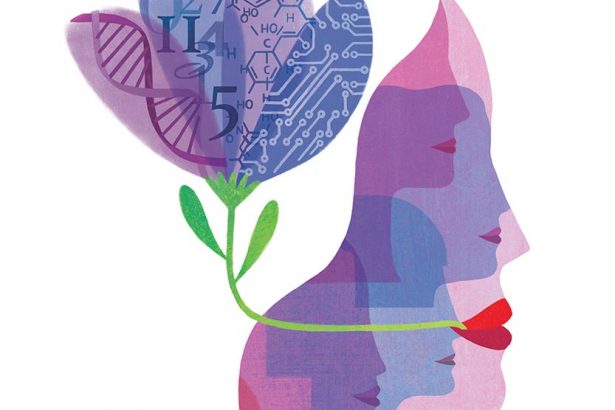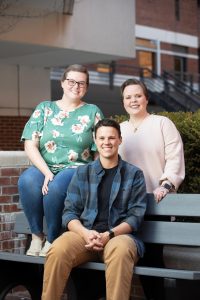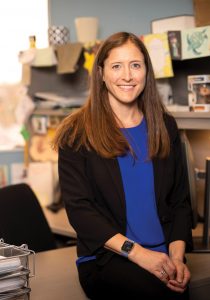Sarcoma Sisterhood
April 29, 2022

illustration by Anna Godeassi
Courtni Hammers remembers feeling sicker than she’d ever been in her life, racked with fever and overwhelmed with flu-like body pain. Having these symptoms in the midst of the COVID-19 pandemic magnified her anxiety.
Hammers, then a 25-year-old Navy hospital corpsman, picked up her phone and called Kelsey Bauman, a 29-year-old dental hygienist living more than 150 miles away in Selmer, Tennessee.
Bauman shared a critical similarity with Hammers — they were both adults receiving treatment for a rare cancer, Ewing sarcoma, at Vanderbilt-Ingram Cancer Center (VICC). In this moment of crisis, that connection was just the lifeline Hammers needed.
“I really felt like I was dying,” Hammers said. “I called Kelsey freaking out and crying because I didn’t know what to do. On hard days, sure, I could call my momma, or I could call a friend, but until someone’s been in the weeds with this, you can’t know or relate to exactly how another person is feeling.”
Ewing sarcoma is a rare cancer typically occurring in the bones or in the soft tissue around bones. An estimated 200-250 adolescent and young adults in the United States are diagnosed with it annually.
“When you have a rare cancer like Ewing sarcoma, these connections become even more important,” said Elizabeth Davis, MD, an oncologist at VICC who specializes in the treatment of bone and soft tissue sarcoma. “These patients understandably get support from each other that nurses, physicians and other people on the treatment team really can’t provide.
“The medical team certainly benefits from the experience of having treated many people and having watched symptoms unfold, but it’s a completely different experience to actually have the treatment and develop side effects and want to talk to someone who is in your shoes.”
Bauman was happy to take Hammers’ call.

Kelsey Bauman, Courtni Hammers and Sam Shreve (left to right) are survivors of a rare cancer, who met in clinic. Photo by Erin O. Smith.
“I tried to help Courtni calm down, and I said she should really listen to her body,” Bauman remembered. “I told her since she was in Nashville and Vanderbilt was close by, if she felt like something was seriously wrong, then she should go to the ER and not wait.”
It was perfect advice. Hammers was extremely ill with what turned out to be a common cold, and because her white blood cell count was low due to chemotherapy, her immune system was unable to successfully fend off the viral infection. She was hospitalized at Vanderbilt University Hospital for five days, supported by Bauman’s encouraging texts.
Hammers and Bauman connected by chance. Bauman kept noticing Hammers in the waiting area of the chemotherapy infusion clinic and soon realized they were on the same treatment schedule. Although they hadn’t spoken, the two women often shared waiting rooms and occupied neighboring infusion bays. COVID precautions that required physical separation — strictly followed in VICC spaces — made it even less likely that the pair would connect.
“One day, I just walked over and said, ‘Hey, I don’t really mean to be nosy, but do you have Ewing sarcoma, too?’” Bauman recalled. “Courtni looked at me, kind of surprised, and said, ‘Yeah!’”
The two began talking, exchanged numbers and were soon trading texts to compare side effects from treatment and to share honestly about how they were coping overall.
The next connection also occurred by happenstance.
“I had been told how incredibly rare this cancer is in adults, and I thought I would never, ever, ever meet someone who’s had this,” Hammers said. “Then, one day I was talking to one of the lab staff, and I said, ‘Ewing sarcoma.’ Suddenly, a voice said, ‘Oh, my gosh! You have that? Me, too!’”
That voice belonged to Samantha “Sam” Shreve, a 29-year-old wife and mother of two young girls, who was also on a treatment schedule for Ewing sarcoma.
“It has been nice to have someone to compare notes with, especially people that were around my age,” Hammers said. “Kelsey and Sam knew exactly what I was feeling.”
Soon, Shreve and Bauman established a close connection as well. They had a great deal in common. Both work in the dental industry and are young mothers.
“Being on the same treatment schedule as Kelsey has been incredible,” Shreve said. “She’s just a really special person, and it may sound weird, but I truly feel like God sent her to me. It’s kind of like she breathes air back into my lungs. I hate that she was going through what she was going through when we met, but inside, I needed her.”
Davis, the oncologist for all three women, loves hearing about the friendships among patients and their families that are forged in waiting rooms and during support group meetings. She also personally facilitates connections between patients with rare cancers who would like to meet others who share similar circumstances.
In addition to her in-clinic duties, Davis serves as the co-director of the VICC Young Adults with Cancer program, along with Cathy Eng, MD, and Michael Byrne, DO. The goal of the young adults program is to provide any and all support needed for patients who are experiencing a daunting diagnosis and treatment during a time when they already have so much on their plates.
And while there are national and international advocacy and support groups to help connect individuals who have rare cancers such as Ewing sarcoma, Davis believes having a relationship with someone who is close by, or at least in the same state, is incredibly beneficial.
“Living with Ewing sarcoma is really challenging because of the rarity and also because it disproportionately affects young people — teenagers and people in their 20s — who are just starting to look for their first houses or first jobs or they’re trying to finish their education. This cancer tends to be one that disrupts all of those things, which has certainly been the case with these ladies.
“For young people who are at that phase of life where you’re supposed to be building and creating all these new things that are going to carry you forward in life, it’s really helpful to meet someone else in a similar situation. And everything about receiving a cancer diagnosis and going through treatment is emotional, so having someone you can call who understands what you’re feeling and experiencing is invaluable.”

Elizabeth Davis, MD. Photo by Susan Urmy.
And these connections are not just therapeutic for the patients, Davis said. Their family members and caregivers also often form supportive relationships.
“Sometimes the spouses are almost better friends than the patients with the rare sarcoma,” she said. “They can talk about symptom management, providing support, and how they handle stress and grief.”
Shreve and Bauman have recently gotten their families together for camping trips, meeting halfway between their hometowns to spend time together outside clinic space. Their husbands are now friends, and Shreve’s daughters are “in love with” Bauman’s young son, Myles.
All three women had similar diagnoses and treatments, but they each walked different paths with Ewing sarcoma. Despite the differences, sharing their stories, tears and triumphs has bonded them in a way they say won’t be affected by distance or time.
Kelsey Bauman
Bauman had just gotten married to her sweetheart, Brandon, gaining three stepchildren she calls her bonus children. Then, she became pregnant with their son Myles. Her pregnancy caused her to develop hydronephrosis, a condition that causes one or both kidneys to retain fluid and swell or stretch.
In February 2020, during her second trimester, intense kidney pain and nausea sent Bauman to a hospital emergency room. There, an ultrasound revealed a mass in one kidney. The medical team was unsure if it was a cyst, tumor or stones, but she was told nothing could be done to address the issue until after she gave birth in August 2020.
“In September, I had another CT scan of my kidney and then a biopsy,” Bauman said. “The doctor said, ‘It looks like cancer, but it doesn’t look like cancer,’ which didn’t make any sense to me. So then I came to see a Vanderbilt urologist, Dr. Daniel Barocas. After another biopsy, it was diagnosed as Ewing sarcoma.”
Davis recommended that Bauman complete her full course of chemotherapy before having her kidney removed. During an open nephrectomy in August 2021 — a year after delivering her son — it was revealed that the tumor was encapsulated and limited to her kidney.
“You know between being pregnant, being postpartum, doing chemo and then having surgery, I had about two years of not feeling good, but I really didn’t realize how bad I felt and how tired I was until now,” Bauman said. “Now, I feel good. I feel really good.”
All three women are now post-treatment and on a schedule of routine monitoring to spot any potential cancer recurrence for a minimum of 10 years. During that time, they know one thing for sure. The bond they formed due to their diagnoses will remain. They plan to continue texting, calling, checking in via Facebook posts and even meeting up when they can.
“I really hope that talking about our friendships helps someone reading this to take that chance to reach out to someone else who is going through a similar situation,” Shreve said. “I know people might be scared to talk to someone they’ve never met. Everyone receives something like this differently. But God is definitely good, and he’s worked in my life in more ways than I could ever have imagined. And when you have the support of someone else who understands what you’re going through, it makes all the difference in the world.”
Courtni Hammers
Hammers had been stationed in Pensacola, Florida, enjoying the beginning of her naval career and flourishing in the coastal environment. She had met and become engaged to her fiancée, Carly. She was in great physical shape, going on daily runs and enjoying her military duty, when she began experiencing what she and her doctors believed was sciatic nerve pain.
In September 2020, it worsened until she was in continual agony and barely able to walk, stand, sit or even sleep. She visited three emergency rooms before her excruciating pain was taken seriously. A CT scan then revealed a large mass on her sacrum, the triangular bone at the base of the spine that is a critical junction for the nerves that run into the pelvis and legs.
An MRI disclosed a tumor that covered the front and back of her sacrum and extended into her pelvis. An emergency tumor resection removed the mass, and Hammers was left with nerve damage that impacted the right side of her leg and foot.
She and Carly moved back to Tennessee so she could be near her family and receive further cancer treatment at VICC. In May 2021, she completed her prescribed chemotherapy and radiation. She and her partner have just purchased a home in Middle Tennessee, and after being medically retired from the Navy, Hammers hopes to pursue a new career in health care.
“I would say I’m 75% back to where I was prior to the cancer,” she said. “My hair has all grown back, which is fantastic. I wasn’t a fan of being bald! I’m not able to really run anymore, so I just stay on my own two feet and walk everywhere. And I’m pretty good!”
Sam Shreve
Shreve is the mother to two young girls — Izzy, 7, and Gracie, 4 — and has been married to her husband, Colton, for over 15 years. She had been having increasing pain in one leg that doctors told her was caused by a pinched nerve in her back. As the pain intensified, despite knowing she probably shouldn’t, Shreve Googled her symptoms. Ewing sarcoma was a possibility that popped up.
“I was reading about it, and I thought, ‘Lord, this just cannot be it. It’s rare in children, but even more rare for adults. This cannot be it,’” she remembered.
She went to an orthopaedic doctor in Bedford County, Tennessee, who suggested rather than take yet another MRI of her back, they instead take images of the leg that was hurting. It was then she learned she had masses in her femur. She was referred to Vanderbilt orthopaedic surgeon Herbert Schwartz, MD, who did a biopsy. On Sept. 9, 2020, he called her with the unwelcome diagnosis of Ewing sarcoma. She was then referred to Davis for treatment.
“Dr. Davis told me that I would have 14 rounds of intense chemotherapy,” Shreve remembered. “She said I’d do six rounds and then have my surgery. After a little bit of time to heal, I’d jump right back into chemo. Everything was happening so quick. As soon as we had confirmation that it was this cancer, it was boom, boom, boom.”
On Dec. 31, 2020, Shreve had a 13-hour surgery to remove the cancer at Vanderbilt University Medical Center. Because of the tumors’ location, she had a partial hip replacement, as well as replacement of a femur and knee. During recovery, her husband and daughters became her nurses, and her new friends Hammers and Bauman were always just a text or phone call away.
Shreve has finished chemotherapy, and she’ll continue returning to VICC for follow-up scans to monitor for any recurrence. Today, she walks with a cane and uses a wheelchair when she needs to. And she looks forward to watching her daughters grow up and to growing old with Colton.
